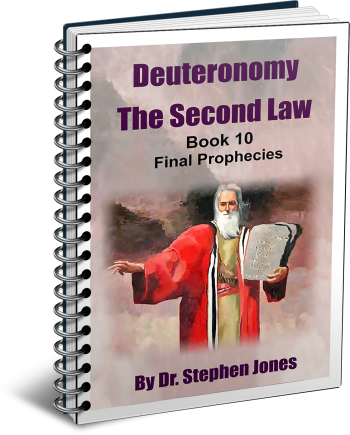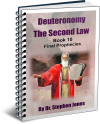Latest Posts
View the latest posts in an easy-to-read list format, with filtering options.

A commentary on the tenth speech of Moses in Deuteronomy 32-34. The book of Deuteronomy is a series of 12 speeches that Moses gave just before his death at the end of Israel's wilderness journey.
Category - Bible Commentaries

Deut. 32:7-14 is the “B” section of the Song of Moses, dealing with the goodness and bounty of Yahweh to Israel. It reads,
7 Remember the days of old,
Consider the years of all generations.
Ask your father, and he will inform you,
Your elders, and they will tell you.
8 When the Most High gave the nations their inheritance,
When He separated the sons of man,
He set the boundaries of the peoples
According to the number of the sons of Israel.
9 For the Lord’s portion is His people;
Jacob is the allotment of His inheritance.
10 He found him in a desert land,
And in the howling waste of a wilderness;
He encircled him, He cared for him,
He guarded him as the pupil of His eye.
11 Like an eagle that stirs up its nest,
That hovers over its young,
He spread His wings and caught them,
He carried them on His pinions.
12 The Lord alone guided him,
And there was no foreign god with him.
13 He made him ride on the high places of the earth,
And he ate the produce of the field;
And He made him suck honey from the rock,
And oil from the flinty rock,
14 Curds of cows, and milk of the flock,
With fat of lambs,
And rams, the breed of Bashan, and goats,
With the finest of the wheat—
And of the blood of grapes you drank wine.
Verse 7 is a poetic introduction, where Moses says to Israel: Don’t take my word for it; ask your parents or the elders of your tribe. They will confirm what I am saying. Moses then gives the background history of the purposes of God, which He foreknew and put into the divine plan.
Verse 8 says that God “gave the nations their inheritance” (NASB) from the beginning, according to the divine plan. The KJV incorrectly renders it, “when the Most High divided to the nations their inheritance…” This gives the impression that God was making divisions, or boundaries, in the earth, essentially carving it up to give each nation its inheritance.
The Hebrew word for “divide” in that sense is parad, “to divide or separate.” Gen. 10:5, 32 uses this term in listing the beginnings of the nations. It shows that God gave all nations their own inheritance. Israel was not the only nation to receive an inheritance. But in the Song of Moses, the Hebrew word used is nachal, “to get as a possession, acquire, inherit, possess.” For this reason the NASB renders the phrase, “When the Most High gave the nations their inheritance…”
Moses tells us that God took into account the population of Israel and established the boundaries (borders) of the surrounding nations accordingly. This appears to be a reference to the border of Canaan, which was extended beyond the Jordan for Reuben, Gad, and half the tribe of Manasseh.
At the time, Israel’s population fit easily into that land. However, as the centuries passed and their population grew, that land was not large enough to contain them. They began to spread out along the Mediterranean coast. The tribe of Dan was among the first to begin this emigration, because their allotted inheritance in Canaan was yet occupied by the Philistines, who were not conquered until the time of King David. Asher’s territory, too, was occupied by the people of Tyre and Sidon, who were seafarers. So these tribes were integrated into the culture of Tyre and Sidon and found work as sailors on their ships.
So we read in the Song of Deborah that during Israel’s captivity to the Canaanites a century later, she chides the tribes of Dan and Asher for not helping Israel throw off the yoke. She says in Judges 5:17, “Why did Dan stay in ships? Asher sat at the seashore, and remained by its landings.”
Even so, God was already planning ahead. The day would come when the Israelites were too numerous for the old land. At the same time, because of Israel’s rebellion against the ways of God, God intended to cast them out of the land and resettle them in new lands. The Assyrians took them north to the shores of the Caspian Sea and the Black Sea, and they later migrated north and west into Europe. Many other Israelites escaped the Assyrian captivity by sea to Phoenician-Israelite colonies.
So God was already preparing for a great increase in Israel’s population, for the prophet Hosea assures us that they would be greatly increased while they were in those other lands, even during their captivity (Hosea 1:10). Hosea says that their population could not be measured or numbered. If he is correct, then it is obvious that this was the divine plan from the beginning, and that God had already planned new accommodations for them in other lands.
Ultimately, the divine plan included the whole earth. As men came under the New Covenant, the population of this new nation would include all men everywhere, as His glory covered the earth (Num. 14:21). In the restoration of Israel, many non-Israelites were to join them and become citizens of this new Kingdom of God (Isaiah 56:8). It is plain, then, that the old land of Canaan is no longer the “Promised Land” of the New Covenant, but was only suitable for the small Israelite nation in the days of Moses.
Who are the citizens of this new nation? When Deut. 32:9 says, “The Lord’s portion is His people,” who all are included as “His people”? Many have assumed this is a biological statement, that one must be descended from Jacob-Israel in order to be called “His people.” But Isaiah prophesies in Isaiah 19:24, 25,
24 In that day Israel will be the third party with Egypt and Assyria, a blessing in the midst of the earth, 25 whom the Lord of hosts has blessed, saying, “Blessed is Egypt My people, and Assyria the work of My hands, and Israel My inheritance.”
Hence, Egypt is called “My people.” Assyria is “the work of My hands.” All are equally blessed as nations, for it is implied that they are in unity with “Israel My inheritance.” Egypt and Assyria were known for the fact that they kept Israel in bondage at different times in history. Hence, it speaks of reconciliation and unity between the nations, for Egypt and Assyria can also be seen as metaphors for all the nations.
So when Isaiah later includes “foreigners who join themselves to the Lord” (Isaiah 56:8) and come under His (new) covenant, his message is consistent with the earlier revelation in Isaiah 19. While Israelites always liked to think of themselves as having a special, exclusive relationship with God, the prophets reveal the inclusiveness of God and His love toward all men. The temple of God was to be “a house of prayer for all the peoples” (Isaiah 56:7). This comes to the forefront in the New Testament, where all men are temples of God, housing His presence.
In Deut. 32:10-14 Moses sings about God’s careful protection of Israel from the earliest days. God “found him in a desert land, and in the howling waste of a wilderness.” This references Israel’s time in the wilderness after coming out of Egypt. They were brought to Mount Horeb and organized into a nation. God cared for them and guarded them when they were attacked by the Amalekites (Exodus 17:8).
Verse 11 pictures God caring for Israel like an eagle caring for her young. We see the same metaphor in Exodus 19:4,
4 You yourselves have seen what I did to the Egyptians, and how I bore you on eagles’ wings and brought you to Myself.
Verse 12 makes it plain that Yahweh, the God of Israel, was the only one who cared for Israel. No other gods were there to help Him.
Verse 13 says that only Israel’s God provided food and water for them in the wilderness. Moses uses metaphoric language here that is not to be taken literally: “He made him [Israel] suck honey from the rock [sela], and oil from the flinty rock [tsur].” The record shows that only water came out of the rock (Exodus 17:6; Num. 20:11). But honey and oil are metaphors, not only for provision itself, but abundance and even luxury. The “rock” also has a double meaning. The word literally means a cliff or wall of rock, but the meaning was also extended to mean a fortress with a rock wall around it. Thus, Moses conveys the idea that God also provided security for Israel.
Verse 14 continues this idea of provision. God gives them milk and curds, meat, and “the finest of the wheat” and grapes. The language conveys the idea that God gave them the best of everything. Of course, in the wilderness, the people lived far more modestly, but Moses was speaking prophetically as well. He was foretelling the abundance of the Promised Land that they were inheriting. This becomes clear when we see Israel’s lack of appreciation in the next section (“C”) from verses 15-19.